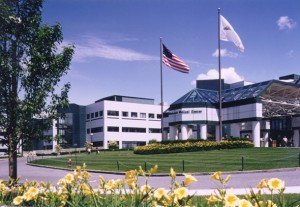
Dartmouth Hitchcock
Founded more than 100 years ago as the Mary Hitchcock Memorial Hospital, Dartmouth-Hitchcock Medical Center in Lebanon, New Hampshire is a landmark New England health facility as well as a landmark environmental steward.
As an active member of Practice Greenhealth – a membership organization for healthcare institutions committed to sustainable, eco-friendly practices – Dartmouth-Hitchcock promotes and practices sustainability, energy efficiency, water conservation and safe waste disposal. Collaborating with Practice Greenhealth, Dartmouth-Hitchcock was the first academic medical center in the U.S. to measure its carbon and ecological footprint and provide the model to other healthcare institutions free of charge. Hundreds of hospitals and healthcare facilities have implemented the Center’s processes and procedures.
When Dartmouth-Hitchcock introduced a rechargeable battery and cellphone recycling program on its campus in 2005, it came as no surprise. This medical institution was already a pioneer in eco-sustainability. Call2Recycle® was the logical next step for a facility at the cutting edge of waste management and recycling practices. Boasting a 35 percent recycling/reuse rate of total waste discard, Dartmouth-Hitchcock recycled 1.8 million pounds of reclaimable materials in 2009 alone. Half a ton of it was depleted rechargeable batteries and cellphones.
Before Call2Recycle, Dartmouth-Hitchcock comingled its spent batteries and cellphones with other waste materials and shipped them via Dartmouth’s waste recycler for processing. This was done at a significant cost. John Leigh, Manager of Waste and Recycling Programs at Dartmouth-Hitchcock, points out that American hospitals generate tons of used batteries from medical equipment, laptops, power tools, and cellphones each year. “Call2Recycle was very appealing to us because the entire process was free. The recycling boxes were provided at no cost and the shipping was taken care of. We didn’t have to reorder additional boxes. Call2Recycle made sure we had replacements. Free, simple and user-friendly was an easy decision for us,” Leigh said.
Call2Recycle collection boxes can be found in numerous locations on the 2 million square-foot Dartmouth-Hitchcock complex. Its 6,000 employees and 360 resident interns deposit their used rechargeable batteries and cellphones in the recycling center near the cafeteria, in the Information Services department, in the Engineering wing, and other strategic areas. Signs posted by the Waste Management staff indicate the drop-off points. For an ecologically minded team, collecting three or four boxes of batteries per month is standard procedure.
John Leigh outlined the Call2Recycle program with the Center’s department managers prior to launch. Today he regards it as an integral part of Dartmouth-Hitchcock’s many green initiatives. “When it comes to the proper treatment and disposal of hazardous materials, our employees are sophisticated,” he noted. “We’re happy to have Call2Recycle on site because it’s a true model of product stewardship. Call2Recycle’s easy-to-use retail-based collection capability is the wave of the future for recycling. They got it exactly right with their operations and recycling infrastructure. Call2Recycle is the perfect match for what we’re trying to accomplish at the Dartmouth-Hitchcock Medical Center.”
ShareMAY